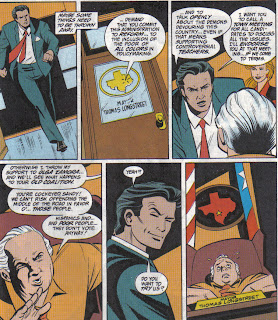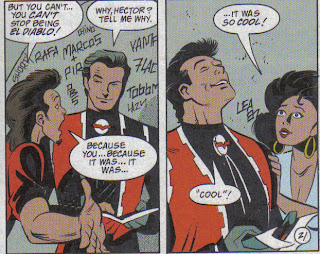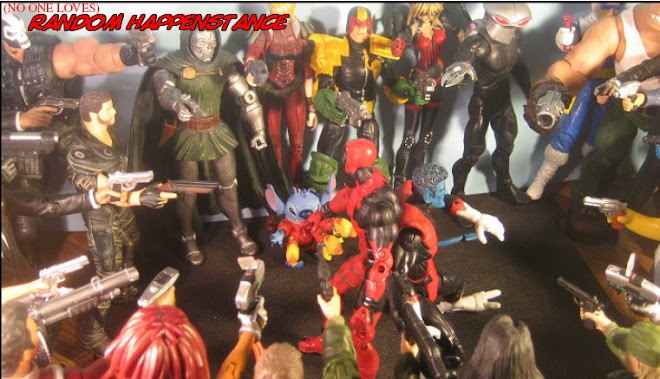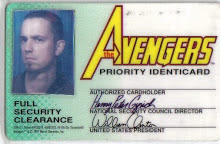I have a ton of cancelled comics, and if there's anything more sad than the last issue of a comic book that showed a lot of initial promise, it's the last issue of said comic where the hero quits superheroing and denounces it as pointless, childish, and stupid. No meta-commentary there, eh? If your book is being cancelled, I would love to see a hero quit for reasons I can identify with, like because people are stupid and don't deserve a hero.

Marvel spun off the Green Goblin into his own book. Sort of. This was near the very end of the Ben Reilly Spider-Man era and before the return of Norman Osborn. So, with Norman still 'dead,' and Harry really dead; the name and trademark was just lying around. Similarly, so was a lot of the Green Goblin's equipment, since Norman was a lunatic who made stashes for spare weapons, costumes, and goblin-gliders all over New York--previously, the Hobgoblin's origin started this way. New character Phil Urich, nephew of longtime Daredevil supporting character Ben Urich, stumbles across a better stash of weapons than Hobgoblin ever did, including a cybernetic mask and costume that gave him powers and control of the glider, wrist-launchers, etc.
(If you're particularly continuity-minded, Hobgoblin's main goal for most of his early appearances in Amazing Spider-Man revolved around him searching for more of Osborn's hidden Goblin weapons. After a particularly grueling fight, Hobgoblin gets away with a map to the last secret hideouts, only to find he's already looted them all; and he declares himself now the better of the Green Goblin and no longer needing to scrounge for a dead man's weapons. Of course, retroactively Norman wasn't dead, so he could have been adding more the whole time, including the more-advanced ones Phil used; and it's easy to imagine Norman doing it just to dick with Spider-Man even then.)

Put kindly, Phil wasn't terribly effective. In his penultimate issue, he wins his "greatest victory" against a Sentinel during the Onslaught crossover, but catches a chunk of shrapnel in his mask. Without the mask, Phil lost his powers, the use of most of his equipment, and any style points he may have had. He gamely tries crimefighting without it, but quickly realizes it's not for him; and right about then Norman was making his...ugh...comeback. (I think some writers have done some good things with Norman Osborn since then, but it's a silk purse-sow's ear thing.)
Losing his job at the Bugle at the same time, Phil is forced to 'put my toys away,' suck it up, be a man, and finish college. Because the next time Sentinels trash Manhattan, a college graduate could save the day...I understand Phil later made appearances in Runaways, but true to form, I think his appearance was because they couldn't use Rick Jones.
Even sadder than Phil quitting because he kinda sucks and sales are spiraling in, is El Diablo throwing in the towel, because he feels like he sucks and sales are spiraling in. Phil's resignation feels like either a natural progression for the character, or because the real Green Goblin would have Phil's head in his man-purse if he didn't quit. Conversely, El Diablo was at the point where the hero would traditionally pout for an issue or two, make a big scene about not doing any good, and 'quit' for about five minutes until a new threat rose up; but the sales weren't enough for him to return. Also, Phil wasn't effective because he was a lazy slacker; Diablo wasn't effective because he was single-handedly trying to rid his city of crime, injustice, racial tension, poverty, gerrymandering, low voter turnout...
 As is often the case, this was a book I knew of but had never actually read until I got it out of the quarter boxes. The last issue came out in 1990, and in my defense it was an 80 mile drive to a comic shop that would even have had El Diablo. In the previous, now penultimate, issue, El Diablo struggles with the problems of illegal immigration from Mexico, and fails: the immigrant he befriended dies, the corrupt border guard that contributed to that death kills himself, and Diablo himself beats up a few people and is left confused, battered, and depressed. Don't feel bad, El Diablo: nobody else has come close to fixing that one either.
As is often the case, this was a book I knew of but had never actually read until I got it out of the quarter boxes. The last issue came out in 1990, and in my defense it was an 80 mile drive to a comic shop that would even have had El Diablo. In the previous, now penultimate, issue, El Diablo struggles with the problems of illegal immigration from Mexico, and fails: the immigrant he befriended dies, the corrupt border guard that contributed to that death kills himself, and Diablo himself beats up a few people and is left confused, battered, and depressed. Don't feel bad, El Diablo: nobody else has come close to fixing that one either. 
In his civilian identity as city councilman Rafe Sandoval, El Diablo was already hip-deep in fighting corrupt officials, backbiting politicians, special interests, racially motivated groups of every stripe, and his own boss; who seemed to fall somewhere between glad-handling good ol' boy of the political machine and well-meaning lesser of two evils. You would think putting on a mask and a kind-of sharp vest and pummelling the snot out of some non-voting lowlifes would be the only thing keeping him sane.
 Perhaps not really helping his state of mind were his Shadow-like operatives...a bunch of high-school age kids, who were fairly realistically prone to in-fighting, jealously, and getting shot. That's probably why you never see the Shadow hanging out, palling around, or even acknowledging his crew. Keep your work and your friends separate!
Perhaps not really helping his state of mind were his Shadow-like operatives...a bunch of high-school age kids, who were fairly realistically prone to in-fighting, jealously, and getting shot. That's probably why you never see the Shadow hanging out, palling around, or even acknowledging his crew. Keep your work and your friends separate! Although I primarily bought the El Diablo issues for the Mike Parobeck art, I was pleasantly surprised by how political this book was. Probably a bit too much so for it's time and the market, but I could see a storyline about immigration causing a ruckus in the blogosphere now. All the problems Diablo faces in his last few issues prove too big for him to just punch in the face, so he has to take on the fight to change the causes, not the products. I'd argue (and writer Gerald Jones may have as well, if the book had continued) that Rafe is banging his head against the same walls in both identities: do you put on a mask and try to catch a serial killer yourself, or do you rally support for a tax increase to put more cops on the street? It does occur to me that a flashy vigilante might be the way to shine a light on problems the press may otherwise ignore.
In the end, Rafe ends up back in the mayor's office, an honest man trying to keep his boss and his party on the right track. Whether intentional or not, the implication is that superheroes (or masked vigilantes) can't make as much of a difference as intelligent, articulate, and well-informed citizens. So if you see any, let them know...
Fight-Man panel from Fight-Man #1, "The Big Fight!" Written and pencilled by Evan Dorkin, inks by Pam Eklund. Love it.
Green Goblin #13, "To Glide No More!" Written by Tom DeFalco, pencils by Josh Hood, inks by Derek Fisher. Since poor Phil wrecked his mask the previous issue, he doesn't get any good action panels as the Goblin in this one. He gets the good girl in the end, but probably screws that up too.
El Diablo #16, "Adios" Written by Gerald Jones, art by Mike Parobeck, inks by Paul Fricke. Probably the only comic I can think of with city council meetings.


1 comment:
Well, I never read El Diablo, but that Mike Parobeck art is certainly nice. It actually sounds pretty good.
Post a Comment